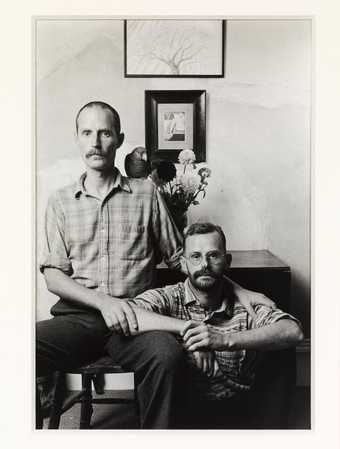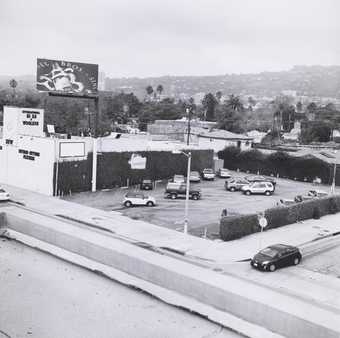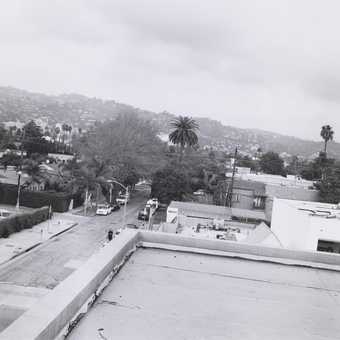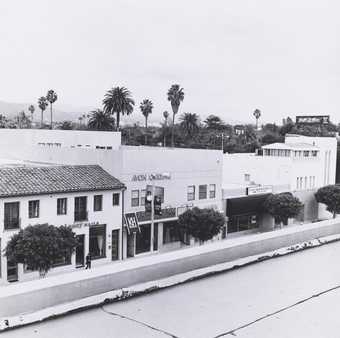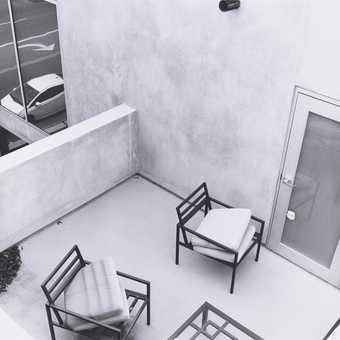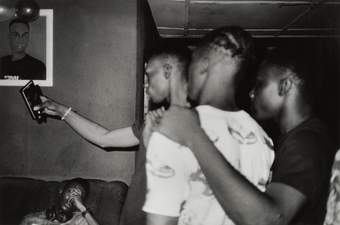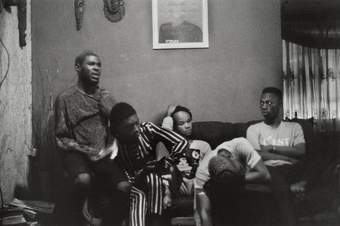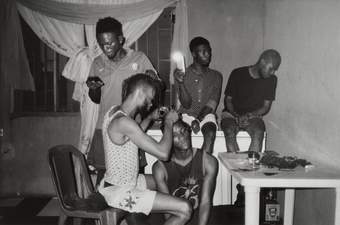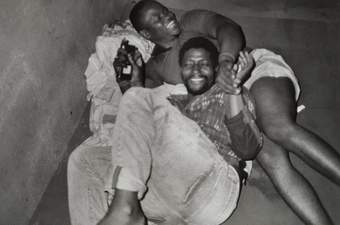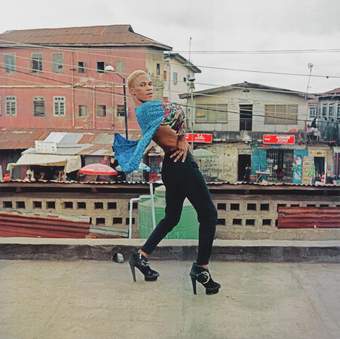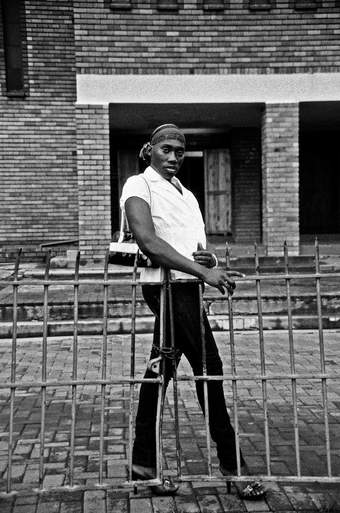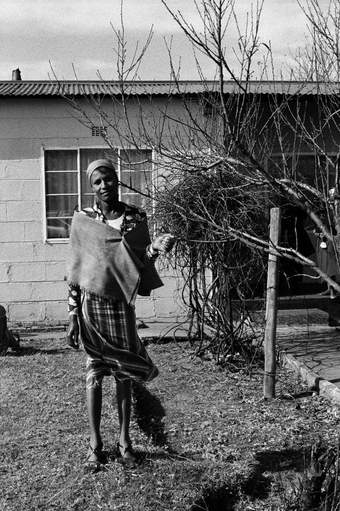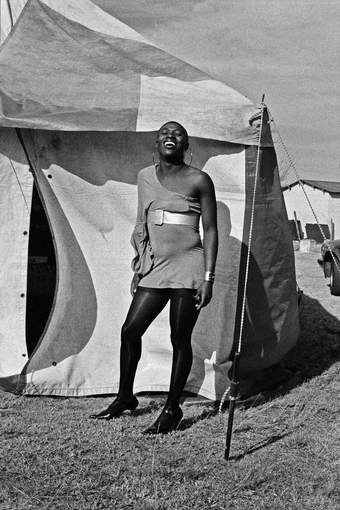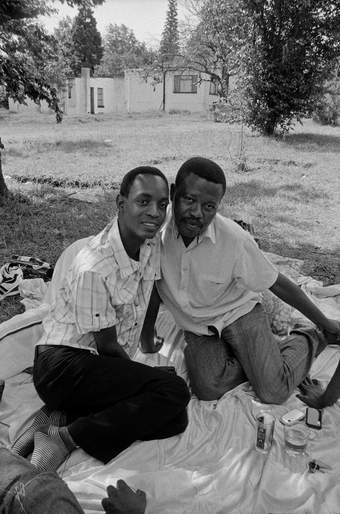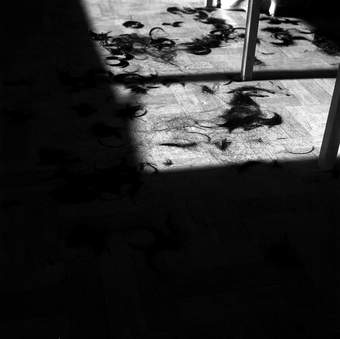
- Artist
- Sabelo Mlangeni born 1980
- Medium
- Photograph, gelatin silver print on paper
- Dimensions
- Image: 373 × 560 mm
frame: 533 × 636 × 31 mm - Collection
- Tate
- Acquisition
- Purchased with funds provided by Mercedes Vilardell, Harry and Lana David, Emile Stipp, Peter Warwick, and Diane Frankel 2023
- Reference
- P82730
Summary
This is one of a group of photographs in Tate’s collection from the series Country Girls by Sabelo Mlangeni (Tate P82719–P82730). Shot between 2003 and 2009, the series offers an intimate portrait of members of Queer communities in rural South Africa, where the artist grew up. The black and white photographs were taken in small towns and rural areas in the Mpumalanga province (Driefontein, Ermelo, Bethal, Platrand, Piet Retief, Standerton and Secunda). The series comprises thirty-three images in total and captures candid moments in the everyday lives of its subjects as well as the spaces where they work, live and socialise. While homosexuality is widely condemned in many African countries, South Africa has seen a rise in new forms of Black Queer self-expression following the legalisation of same-sex conduct in the years following the end of apartheid. Capturing a proud and strongly African identity, Mlangeni’s series depicts street scenes, social gatherings and political events where gay identity is made visible to a wider public.
A number of the images in the series present street-scene portraits in which the texture of gay life in the Mpumalanga province is evidenced in the stylish and expressive use of clothing. In each image, a humble glamour is fashioned from the borrowed shoes, homemade clothes and hand-me-downs worn by the ‘country girls’. In one image, Mlangeni depicts ‘Bigboy’ wearing a homely outfit, including a brimmed hat and floral dress traditionally worn by township mothers (Lwazi Mtshali, ‘Bigboy’ 2009 [Tate P82720]). In another image, Palisa is photographed wearing stockings and a short winter coat against the backdrop of a mine slag heap on a Highveld winter’s day (Palisa 2009 [Tate P82721]). Although these clothes do not seem adequate against the cold, they reveal an individual quest for a fashionable cosmopolitan identity in a rural environment.
In many African countries, gay issues are widely associated with the cultural and social effects of globalisation. Mlangeni’s Country Girls explores the self-expression of a marginalised community, raising questions about the influence and visibility of gay life in traditional African societies. For many more conservative South Africans, these figures occupy a symbolic space; they are both threatening and desirable, celebrated and despised. Rather than representing the ‘country girls’ as social ‘others’, the artist spent six years photographing these communities to build a sense of intimacy and empathy with his subjects. While the persistent and ongoing discrimination towards LGBTQ communities continues, Country Girls attests to the possibility of radical self-expression in challenging social environments and the shifting attitudes of contemporary South African society.
Describing his practice in general, Mlangeni has said: ‘When I work I’m always mindful of the stereotyping that South Africa – and Africa in general – is often subject to in art and the media … I try to bring another aspect to my country and my continent, by portraying the outsider, those people who aren’t usually given a voice.’ (Quoted in Wermuth 2019, accessed 1 July 2020.)
Further information
Sabelo Mlangeni, Country Girls, Michael Stevenson Gallery, Cape Town 2010.
Tamar Garb (ed.), Figures and Fictions: Contemporary South African Photography, Göttingen 2011.
Livia Wermuth, ‘Sabelo Mlangeni: “Portraying the Outsider”’, website of The Walther Collection, 1 April 2019, https://www.walthercollection.com/en/collection/activities/sabelo-mlangeni-black-men-in-dress, accessed 1 July 2020.
Osei Bonsu
June 2020
updated Sarah Allen, January 2021
Does this text contain inaccurate information or language that you feel we should improve or change? We would like to hear from you.
Display caption
Taken over a period of six years in small towns in the Mpumalanga province, Country Girls is an intimate portrait of gay life in the South African countryside. Mlangeni’s series draws attention to the ways these communities have fashioned their own identities outside of the city. In these images, local hairstylists, drag queens and beauty pageant contestants come together at family gatherings and social occasions. Despite the equality promised in South Africa’s 1996 constitution, these daily acts of love, intimacy and friendship take place in the face of continued violence and discrimination. Mlangeni’s images reveal how people carve out spaces to work, love, and find community. Capturing their visibility and vulnerability, the series celebrates the resilience of these individuals.
Gallery label, June 2023
Does this text contain inaccurate information or language that you feel we should improve or change? We would like to hear from you.

